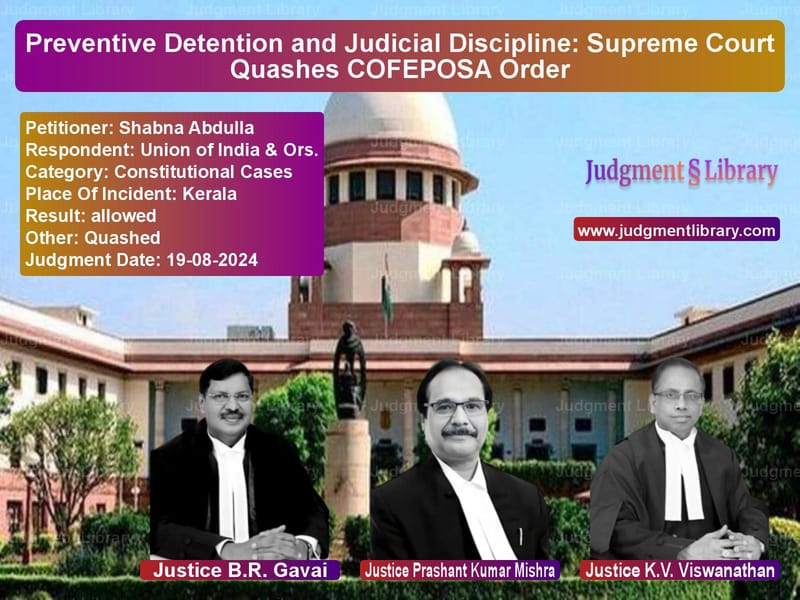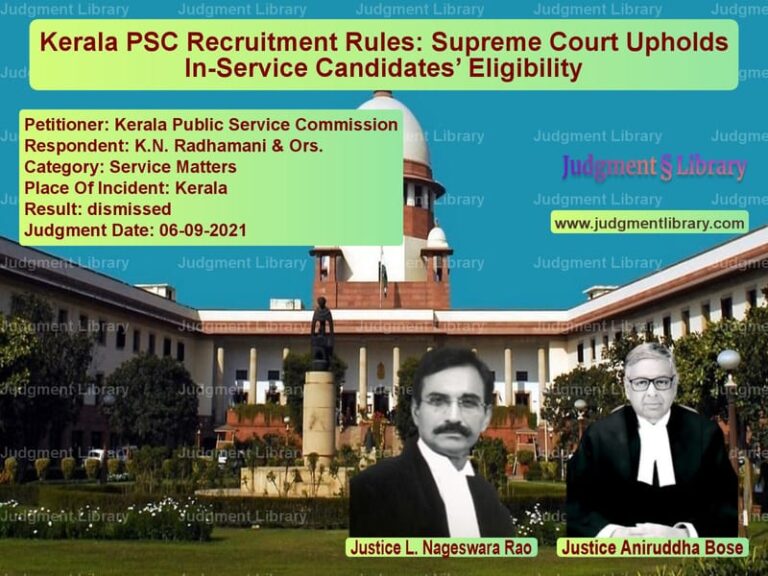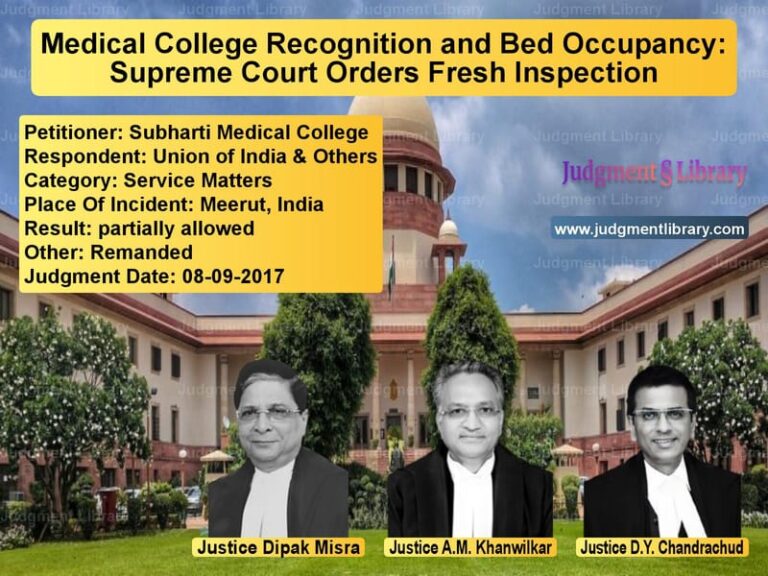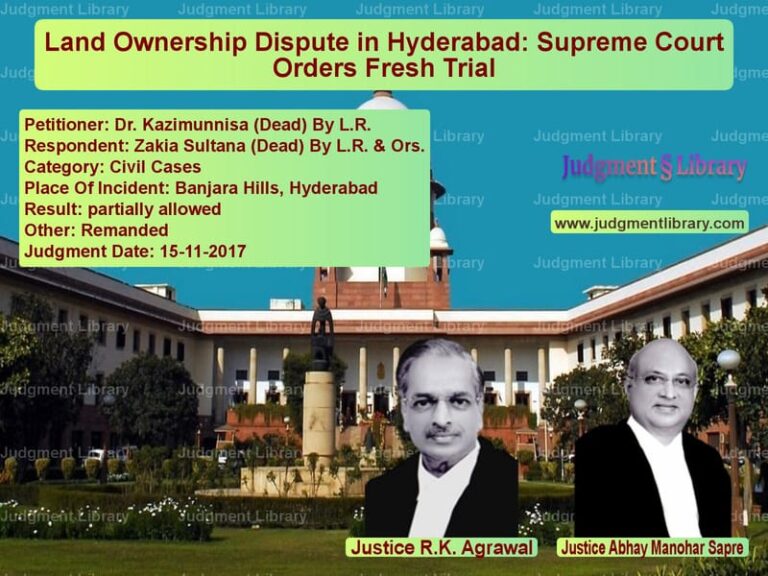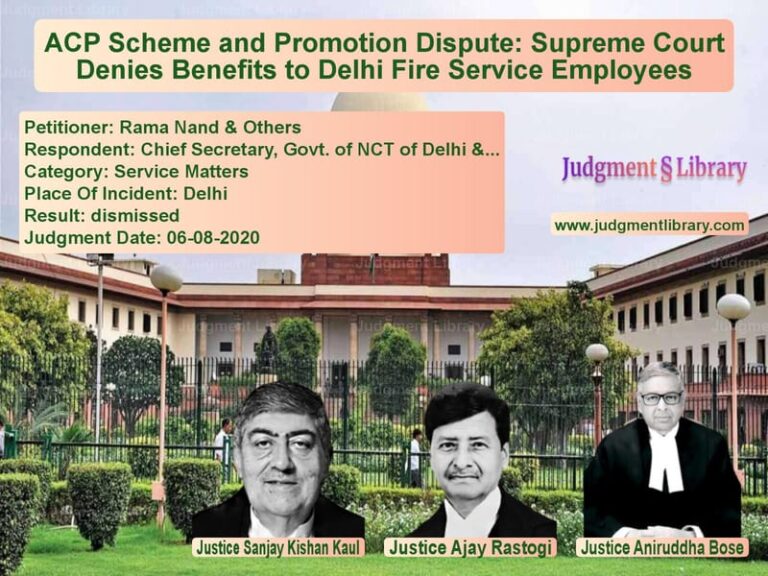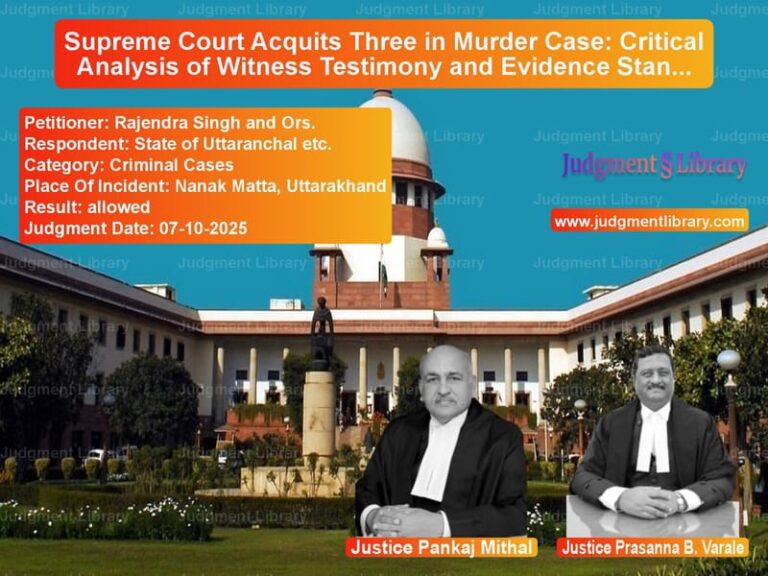Preventive Detention and Judicial Discipline: Supreme Court Quashes COFEPOSA Order
The Supreme Court of India recently ruled in the case of Shabna Abdulla vs. Union of India & Ors., setting aside a preventive detention order issued under the Conservation of Foreign Exchange and Prevention of Smuggling Activities Act, 1974 (COFEPOSA). The judgment emphasizes the fundamental right to a fair hearing and judicial discipline while dealing with detention orders.
The ruling highlights the importance of ensuring that detention orders are not upheld based on selective judicial interpretations. The Court found that the Kerala High Court had wrongly dismissed the appellant’s plea while another Coordinate Bench of the same High Court had quashed identical detention orders in related cases.
Background of the Case
The case arose from a large-scale gold smuggling operation uncovered at Cochin International Airport. The Directorate of Revenue Intelligence (DRI) intercepted unaccompanied baggage that contained 14.76 kg of smuggled gold, worth over Rs. 7.16 crore. The primary accused, Abdul Raoof, a resident of Dubai, was alleged to be the mastermind behind the operation.
Key facts:
- Gold was found hidden inside a refrigerator compressor in baggage belonging to an individual named Althaf Moosan Mukri.
- Statements from co-accused revealed that Abdul Raoof ran a cargo forwarding business and used unsuspecting passengers to smuggle gold.
- The authorities issued detention orders under COFEPOSA against Abdul Raoof and three co-accused, including his father-in-law and brother-in-law.
- Abdul Raoof was arrested on March 5, 2022, and was served with the detention order dated August 24, 2021.
Legal Issues Considered
The Supreme Court examined the following key legal aspects:
- Whether the Kerala High Court was justified in upholding the detention order when an identical order was quashed for co-accused.
- Whether the detainee was deprived of his right to make an effective representation under Article 22(5) of the Constitution.
- Whether the authorities failed to provide crucial documents, including WhatsApp chat records relied upon in the detention order.
Arguments by the Appellant
The appellant, represented by Senior Counsel Raghenth Basant, contended:
- The Kerala High Court had quashed the detention orders of three co-accused on June 3, 2022, but refused to do the same for Abdul Raoof.
- The authorities failed to provide crucial WhatsApp chat records and other documents used to justify the detention.
- Denial of these documents prevented the detainee from making an effective representation against his detention, violating Article 22(5).
- The detention order was based on the same evidence as the cases where detention was quashed.
Arguments by the Respondents
The Union of India, represented by Senior Counsel Nachiketa Joshi, countered:
- The detention order was based on extensive evidence beyond WhatsApp chats.
- The detainee had engaged in organized smuggling and posed an economic threat.
- The Kerala High Court was correct in distinguishing this case from others.
- The detainee had received sufficient opportunity to challenge the order.
Supreme Court’s Observations
1. Non-Supply of Relevant Documents Violated Article 22(5)
The Court held that the failure to provide WhatsApp chat records deprived the detainee of his right to make an effective representation.
“When a detention order relies on certain material, the detainee must be given access to the same. Non-supply of WhatsApp chat records has vitally affected the detenue’s right under Article 22(5) of the Constitution.”
2. Judicial Discipline Must Be Maintained
The Court criticized the Kerala High Court for disregarding its own Coordinate Bench’s earlier ruling.
“If a Coordinate Bench of the High Court had already quashed detention orders on the same grounds, another Bench cannot take a contradictory stand.”
3. Detention Order Was Arbitrary
The Supreme Court held that the detention order should not have been upheld selectively.
“When three other detenus were granted relief based on identical evidence, denying the same to Abdul Raoof is arbitrary and unsustainable.”
Final Judgment
The Supreme Court ruled:
- The appeal is allowed.
- The detention order dated August 24, 2021, is quashed.
- The confirmation of the detention order dated May 24, 2022, is also set aside.
- The detainee is ordered to be released immediately.
Implications of the Judgment
This ruling has significant implications for preventive detention cases:
- Ensures Fair Trial Rights: Reinforces the need for authorities to provide all relevant documents to detenues.
- Strengthens Judicial Discipline: Prevents contradictory rulings from the same High Court.
- Prevents Selective Detention: Ensures that detention orders are applied consistently across similar cases.
- Upholds Constitutional Protections: Reaffirms that preventive detention must adhere to procedural fairness.
The Supreme Court’s decision in Shabna Abdulla vs. Union of India & Ors. is a landmark ruling that protects the rights of individuals against arbitrary preventive detention. The judgment ensures that courts maintain consistency while upholding fundamental rights.
Petitioner Name: Shabna Abdulla.Respondent Name: Union of India & Ors..Judgment By: Justice B.R. Gavai, Justice Prashant Kumar Mishra, Justice K.V. Viswanathan.Place Of Incident: Kerala.Judgment Date: 19-08-2024.
Don’t miss out on the full details! Download the complete judgment in PDF format below and gain valuable insights instantly!
Download Judgment: shabna-abdulla-vs-union-of-india-&-ors-supreme-court-of-india-judgment-dated-19-08-2024.pdf
Directly Download Judgment: Directly download this Judgment
See all petitions in Fundamental Rights
See all petitions in Public Interest Litigation
See all petitions in Legal Malpractice
See all petitions in Judgment by B R Gavai
See all petitions in Judgment by Prashant Kumar Mishra
See all petitions in Judgment by K.V. Viswanathan
See all petitions in allowed
See all petitions in Quashed
See all petitions in supreme court of India judgments August 2024
See all petitions in 2024 judgments
See all posts in Constitutional Cases Category
See all allowed petitions in Constitutional Cases Category
See all Dismissed petitions in Constitutional Cases Category
See all partially allowed petitions in Constitutional Cases Category

